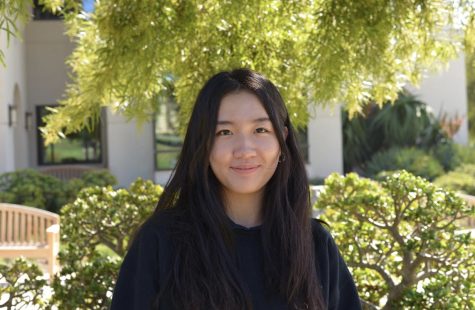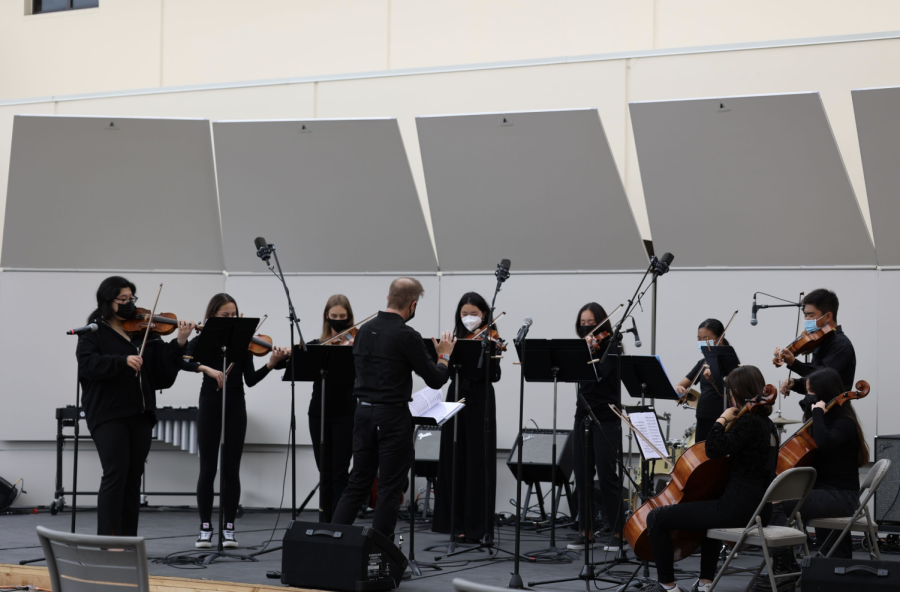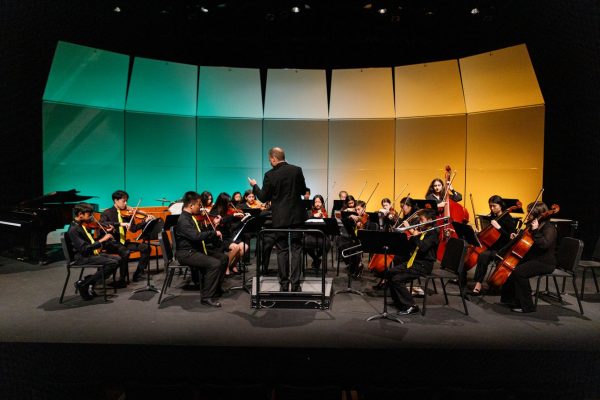Music Amidst Uncertainty
The future of music at Bishop’s is uncertain because of the pandemic.
It was August 2021. School had just begun and performing arts students were looking forward to their first full, in-person rehearsal since March of 2020.
However, as with many other school events, performing arts practices were affected by the sudden surge of Omicron over winter break and early January. “Due to the larger size of the orchestra this semester and the increased transmissibility of the Omicron variant, the administration requested that we reduce capacity in the rehearsal room for the first several weeks, and reevaluate after that,” noted Director of Instrumental Music Mr. Robert Anderson in an interview, in addition to sending an informative email to all student orchestra participants.
Especially since traditional practices are held within closed, indoor spaces, COVID safety has always been at the forefront of discussion for the Performing Arts Department. In mid-September, the California Department of Public Health (CDPH) updated the COVID-19 Public Health Guidance for K-12 Schools in California, providing recommendations and requirements for school-based extracurricular activities and further clarifying modified quarantine recommendations, which mainly impacted students playing a wind instrument.
At that time, the continuation of orchestra as an afterschool activity relied on a choice between three options: conducting all orchestra practices outdoors, using professional face and instrument coverings, or performing weekly screening PCR or antigen tests of all wind players including those vaccinated. Mr. Robert Anderson decided that the orchestra will proceed with the last option, which requires weekly COVID-19 testing in order for practices to be considered safe for individual musicians to be permitted to play in my band/orchestra room. Everything proceeded accordingly until the holiday season.
One of the more noticeable changes in a series of proactive safety measures enacted by the school administration and performing arts department is the division of sectionals. Strings, woodwinds, and percussion players will be practicing on separate dates, allowing for a smaller group in the orchestra room each Thursday. “It has definitely been more typical to practice as a group, but I think that, in a way, this new sectional opportunity has given us a chance to practice with our groups individually,” noted Athena. “This is very beneficial for us since we are starting out with new pieces.” String players had attended the modified practice on January 20, wind players participated on January 27, and percussion players will be practicing on February 3.
“I definitely thought that maybe orchestra would have been canceled altogether, which would’ve been really sad,” said Athena Hernandez (‘23), a violin player. “Our orchestra also grew [in number] a lot this semester, which is good, but not the safest for COVID concerns.” Natasha Mar (‘23), a cello player, echoed this viewpoint. “In the beginning, when I heard about the huge rise in cases, I was worried that we would have to go back to how it was before like last year,” she explained, “where the brass wasn’t even able to play and they had to try out other instruments and such, but I’m really glad that wasn’t the case.”
For choir participants, the change was similar. Though the same COVID protocols remain in place, the group now meets in the chapel, a considerably larger space than the choir room, in addition to more free-flowing air. “Obviously, no one likes singing with a mask on—it is more difficult to breathe, it makes understanding the words we are singing more difficult, and it muffles our voices,” explained Dr. Christine Micu. “However, we all do it to keep each other safe.”
Another noticeable change is concert attendance. Although performing arts venues can seat more, Bishop’s only sells a max of 100 tickets to every event. “Fortunately, we are allowed to have events inside, unlike last year, when we had to have concerts and the musical on our outdoor stage on the terrace,” explained Dr. Micu. “Performing outdoors is much harder, and means a whole lot more work for our technical theater department.”
She also noted that if our communities’ COVID numbers get worse, the department will have to revisit their protocols to see if moving outdoors is necessary. As of January 20, Knight’s News reported a 2.26% case rate compared to a peak of 11.64% as a result of testing on January 7, 10, and 11, showing a positive trajectory.
The performing arts retreat planned for January 28 to 30 was also impacted by the surge. “At the beginning of January… we just did not feel it was safe to plan an overnight event that would have students sharing bunk rooms for sleeping where they would not be wearing masks,” said Dr. Micu. This decision was also supplemented by the fact that the retreat largely engages students in workshops where about 100 students gather in one large indoor room. “Two years ago, when we had our performing arts retreat, it was at school,” said Natasha, “although the activities were fun and such, I think a lot of people were looking forward to actually having the getaway aspect of a retreat…it would’ve been a great bonding experience.”
However, the indefinite delay may not be absolute. “Because of the busy spring calendar, we will probably not be able to go away for an overnight trip—but we will plan something fun and engaging for all the performing arts students that hopefully everyone will feel safe participating in.”

Crystal Li joined The Tower in her freshman year when she moved from Shanghai to San Diego in 2019. Now a senior, she fondly looks back on the four-year...







